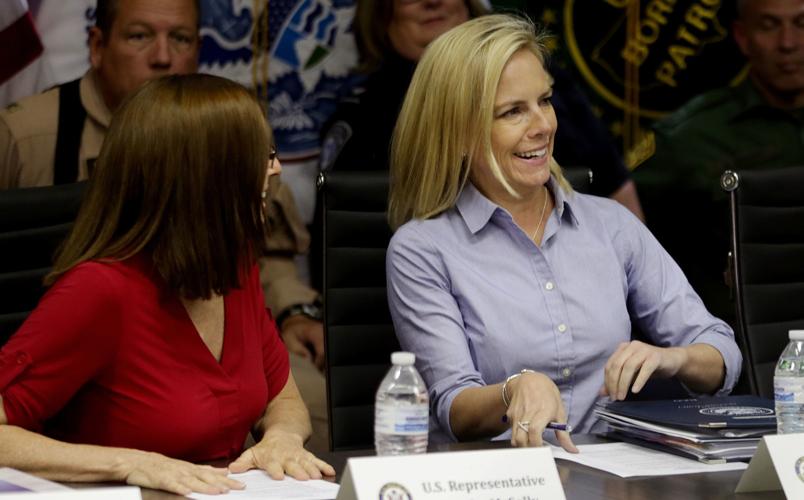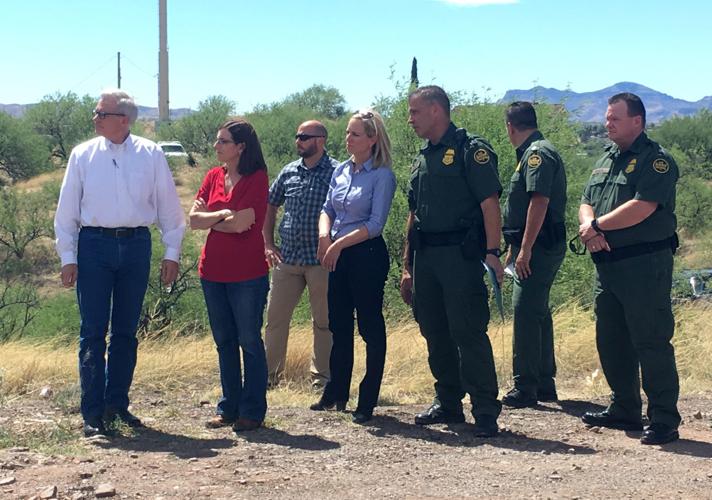NOGALES — The border is in crisis and being exploited by smugglers, but the administration is taking steps to put an end to the lawlessness, Department of Homeland Security Secretary Kirstjen Nielsen said Thursday.
People continue to cross the border illegally, she said, “because they can and because they do not face any consequences.”
Nielsen visited Nogales as part of a Southern Arizona tour that included the ports of entry in Douglas and Nogales and roundtable discussions with border community business leaders, ranchers and law enforcement officials. She was hosted by Rep. Martha McSally and accompanied by Rep. David Schweikert, both Republicans from Arizona.
In a brief news conference after Nielsen toured the ports of entry and met with stakeholders, she spoke about the deployment of the National Guard and the administration’s zero-tolerance policy to refer for prosecution everyone apprehended by Border Patrol.
She also said her agency will use funding from fiscal years 2017 and 2018 to build 150 new miles of wall and refurbish other fencing that needs upgrading. Congress needs to support a wall system that will enable agents and officers to keep the community safe, she said.
“It’s a very large and dangerous mission we’re undertaking here to secure the border on behalf of the American people and we couldn’t do it without their support,” she said.
The administration often cites recent rises in apprehensions at the Southwest border, mostly of families and unaccompanied minors, as a reason for a wall and to close what they call “legal loopholes” in the asylum system.
Based on this increase, the D.C.-based think-thank Migration Policy Institute said it’s possible for apprehensions to return to the 330,000 to 480,000 level of fiscal years 2010 through 2016, but notes they are still far from the peak of 1.6 million seen in 2000.
Nielsen said she wanted to hear about how “the lawlessness and insecurity of the border” affect landowners, ranchers and businessmen directly.
While she recognizes the need to improve infrastructure and facilitate trade and travel at ports of entry — a major concern for the area’s business community — she said she was focusing on border security “because for reasons I can’t explain, there are those who don’t want us to enforce the laws, and I’m here to say we need to and we will.”
Jaime Chamberlain, president of J-C Distributing Inc. in Nogales, who was among the group who met with Nielsen at the DeConcini Port of Entry, said he was pleased he was able to give officials a different perspective about the border and the economy.
He talked about trade and the importance of the ports of entry and the value that each additional Customs officer brings to the economy, he said. Just in Nogales, he said, Customs is short anywhere from 200 to 250 officers.
“It’s very sexy and grabs headlines to talk about border security,” he said. “But when people talk to me about border security, I live in a very safe community in Nogales. I’m always thinking about economic security and the value we bring to each other.”
This was Nielsen’s second trip to Arizona. McSally said she wanted her to see and hear about the issues those who live and work along the border face and how they differ depending on the community.
“When you see things first hand, what the impact is, what’s working and not working ... when you are hearing from agents on the ground,” McSally said, “it helps to build her situational awareness.”
McSally also talked about her bill, Securing America’s Future Act, which she said would address many of the issues they heard about during this trip.
The border tour came a day after a subcommittee hearing in Phoenix to examine the opioid epidemic.
“If you want a holistic solution” to the opioid problem and border security, Schweikert said, “part of the solution is right here because this is not just an Arizona crisis or a border crisis, it’s a national crisis.”
Jill Marie Bussey, director of advocacy for Catholic Legal Immigration Network Inc., or CLINIC, issued a written statement Thursday saying Nielsen’s trips to the border here “have not included faith and community organizations that may offer different perspectives on conditions at the border and what drives people to seek safety.”
“We hope the secretary will soon meet with the communities who serve our brothers and sisters, many of whom are very young children.”





